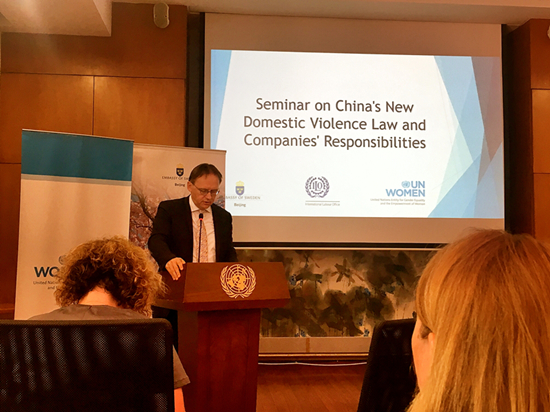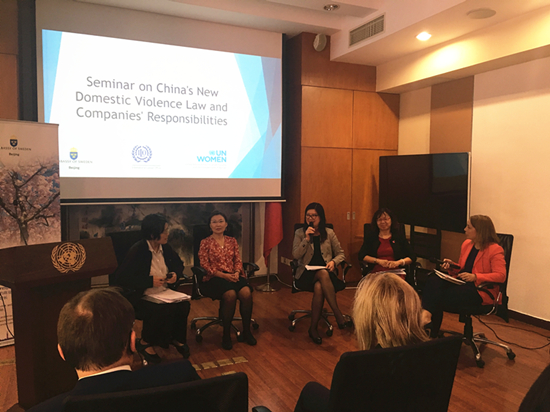 On May 9th, the UN Women, the Swedish Embassy in China and the International Labour Organization (ILO) held a seminar on anti-domestic violence law and corporate responsibility at the UN building in Beijing. This seminar ensued from the "2016 International Conference on Gender Equality and Enterprises' Social Responsibility" held in Beijing in November 2016. Ms. Pan Jun, deputy chairman and chief executive officer of Fazheng Group, was invited to participate in the activity, as a corporate representative.
On May 9th, the UN Women, the Swedish Embassy in China and the International Labour Organization (ILO) held a seminar on anti-domestic violence law and corporate responsibility at the UN building in Beijing. This seminar ensued from the "2016 International Conference on Gender Equality and Enterprises' Social Responsibility" held in Beijing in November 2016. Ms. Pan Jun, deputy chairman and chief executive officer of Fazheng Group, was invited to participate in the activity, as a corporate representative.
The first anti-domestic violence law in China was formally implemented in March 2016, indicating that women's rights protection has further developed in China. The seminar reviewed the overall implementation of the anti-domestic violence law. At the same time, SynTao and the Asia Foundation presented the first research on the relationship between the domestic violence and the corporate performance.
According to Ye Wei, director of the UN Department Agency of Women』s Rights and Interests, rich experience has been gained with the anti-domestic violence law implemented in the past 14 months due to the joint efforts of the Chinese government and all sectors of society. However, the discussion on topics such as the impact of domestic violence on enterprises, how enterprises should deal with the domestic violence, and what support they need, has only just begun.
Guo Ruixiang, project coordinator of the UN Women, says that "the anti-domestic violence law mentions corporate responsibility. Enterprises should have the necessary relevant knowledge and skills to include gender equality into their social responsibilities, which is crucial for enterprises to be able to respond to domestic violence」.. She shows that, in fact, one outstanding issue on this study is the 「data」. 「Because of the existing traditional views and the influence of some social factors, the victims of domestic violence in China often tend to keep silent, making it difficult to conduct the investigations and research. I think that the public』s knowledge of this aspect should be completed and made mature as soon as possible. However, it needs time and the effort of the whole society.」
Derma, head of the China & Mongolia Bureau of the International Labour Organization thinks that 「domestic violence is not just a 'domestic affair' but also a problem contributing to deep social and economic impacts. Domestic violence not only ruins the safety and well-being of individuals, but also reduces the family income, affects the financial performance of enterprises, and places heavy pressure on social security budgets. He stresses that the government, the employee organizations and the employer organization shall show common concerns for the impact of domestic violence on the workplace, and take joint action. A comprehensive solution is required to reduce the domestic violence impact in the workplace.」
Liu Bohong, well-known Chinese expert on female issues, as well as professor of China Women's University, thinks that although the anti-domestic violence law has been implemented for some time in China, much work still needs to be done to implement some specific mechanisms. "These mechanisms must be consistent with our social characteristics in China. I will also conduct research in this area. 」
As a well-known corporate representative, Ms. Pan Jun, CEO of Fazheng Group, also put forward her own views on the role that enterprises play in domestic violence. She thinks that it is a social project to object to the domestic violence, requiring the joint participation of multiple forces. The key to promoting women's family status is to improve women's social and economic status, which requires companies that are the social and economic leaders to make unremitting efforts. Fazheng Group has played a very active role in this aspect.

She stresses that in the glorious history of the development of Fazheng Group, in the past 20 years, women's contributions cannot go unnoticed. By the end of April 2017, the Group had more than 2,000 employees, including more than 1,400 female employees, accounting for 69% of the total number of employees. The international education flagship brand - Royal School owned by the Group has up to 81% female employees, with635 female teachers and teaching auxiliary staff included. Among them, staff possessing bachelor's, master's or doctor's degrees account for 81%, and the overall degree of education is high. In Fazheng Group, the proportion of female employees in middle-level and above management is up to 51%. Fazheng Group firmly believes that, only by fully respecting women's status in the family, society, and enterprise, attaching importance to women's leadership, offering them equal opportunities to learn and work, and the space to fully demonstrate their skills and ideas, can enterprises maintain their dominant position in the competition, smoothly promote and realize their own development strategies.
A total of 60 representatives from the government, enterprises, international organizations, non-governmental organizations and academia participated in the seminar.




